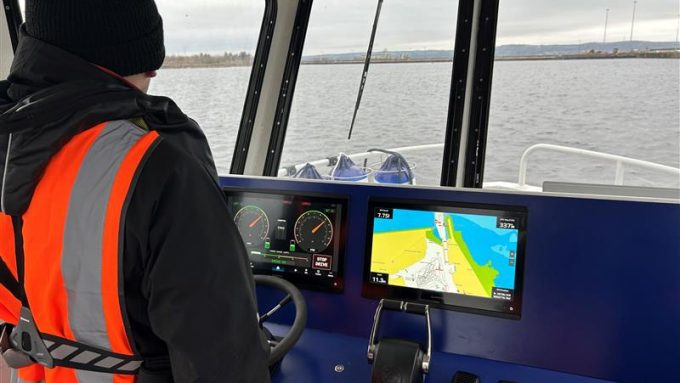
TRIG alumni offer words of wisdom to transport innovators

Entrepreneurs with great ideas must never give up on their dreams, delegates to a showcase event in Birmingham heard at the end of last year, marking the 10th anniversary of TRIG – the Transport Research & Innovation Grants programme.
A panel of five speakers who received funding and support through TRIG in recent years spoke about their experiences of the programme, and offered advice to participants about to take part.
As well as showing resilience, it was said that future participants in the TRIG programme should welcome collaboration with others – and have a clear plan of where they go after their involvement on the programme ends.
Haseena Bheekhun, the Chief Operating Officer of Unitrove said that participating in TRIG allowed the company to meet a future consortium partner, and that being associated with the programme provided “added credibility, helped us to have conversations, and validated what we are doing to propel us towards further innovation”.

Haseena – whose company developed a liquid hydrogen fuelling station for aircraft – added: “I can highly recommend the Connected Places Catapult network, as they are there to help.”
She said rejection can be “part of the game as an SME”, but urged other companies to “never give up, and keep going” and that feedback from the programme will help companies to inform their next decisions, and “understand what you can do better”.
Haseena said that procurement in innovation needs addressing in order to “create a business framework around innovation, that can get us over the finish line faster.”
Her advice to SMEs embarking on the programme was to “make TRIG part of your day-to-day operations. Six months will go in the blink of an eye, so leverage the Catapult’s support network who will cater for your needs”. As a result, she added, the “likelihood is the outcome you are trying to achieve will be met – and possibly superseded”.
Dr Alalea Kia, an Advanced Research Fellow from Imperial College London spoke about a climate change resilient, puddle-free pavement surface she is developing.
“The TRIG programme was essential in enabling us to produce an extensive dataset of the skid and slip resistance performance of our new pavement surface. We are now in discussions with local authorities to implement our technology in different settings.”Dr Alalea Kia, Advanced Research Fellow, Imperial College London
Alalea said it is always important for innovators to remain resilient and to never give up on their ideas. It may be that a technology is less relevant at a particular time, but if you are certain that it will be transformational in the future, “continue developing your idea and make it a success.”
“As an academic, I know there are a lot of great ideas out there and one of biggest challenges is talking to the right people, including those who can influence policy”. Collaboration can lead innovators in a “completely new direction” and help get “ideas deployed and used by the public”. The TRIG programme, she added, “helped us to showcase our idea, connect with policy makers and start conversations on new pavement deployments”.
Alalea urged members of the new cohort to “have a really clear plan for what you want to achieve by the end of the programme” and to network as much as possible.
Also taking part in the panel discussion was Dr Lewis Hunter, a Knowledge Exchange Associate from the University of Strathclyde, who has worked on an electric heavy goods vehicle charging infrastructure project in Scotland called WattRoutes.
“Having the support of the Department for Transport and Connected Places Catapult led us to have some really interesting conversations with large hauliers across the UK and Europe,” he said. The TRIG programme, he added “helped get us in the door of these companies”.
“We were really fortunate to have an early link with the Catapult’s academic engagement lead, who got us in front of the Department for Transport and Transport Scotland. Early engagement is so important.”
Lewis added: “It’s really important halfway through your TRIG programme to know where you want to go after TRIG” and to have a “clear idea for where you want your project to go”. He added that participants in the programme will find themselves in a great situation by working closely with the Department for Transport, “so use that while you have it”.
Discussion panellist Silviu Pirvu, the Chief Technology Officer for Optimal Cities – which developed local transport decarbonisation decision tool GapFinder – said the support of TRIG helped the company to secure further funding from the European Space Agency. He added that the programme was “very valuable for us to move the business forward and create a portfolio of projects we trailing in a real world scenario”.
Silviu said a major barrier to innovation as an SME is procurement. “Many technology companies simply cannot tick all the boxes, so reviewing procurement conditions to focus on outcomes would be really important.”
He advises SMEs on the programme in future to “share the lessons you had, but keep hold of your intellectual property. Always be careful about sharing technical or business secrets; so you can ensure your company and partners can grow with you”.
A fifth speaker on the panel was Tatseng Chiam, the Co-founder of shared transport platform RideTandem. He said TRIG has been a “massive springboard” for the company, helping it to employ 50 new staff and secure private sector funding. “TRIG funding was critical in setting us on a path to growth,” he said.
Tatseng agreed that procurement around innovation needed addressing, especially around requirements to provide several years of management accounts. “The average SME innovator is not going to have that level of accounts. A lot can be done around procurement that still ensures taxpayers get value for money, but doesn’t hold SMEs back.”
Minister speaks, and award winners recognised
The event, which introduced the TRIG 2024 cohort – featured an address from Mike Kane MP, the Aviation, Maritime and Security Minister. “This year, we are offering grants of up to £45,000 to accelerate new and innovative solutions to the transport challenges of tomorrow,” he said.
“We called for innovations that could help to decarbonise local transport, and we called for solutions to help clean up maritime, which has traditionally been a difficult industry to decarbonise.
“Emerging and critical technologies was a new category for 2024 and received the highest number of applications. Finally, an open call returned this year – giving innovators free reign across all modes, challenges and technological areas.
“All these projects will support our shared ambitions for transport. But more than that, they will shape our shared future.”

The showcase event also celebrated the success of the TRIG 2023 cohort, and included the annual Chief Scientific Adviser awards, presented by Professor Sarah Sharples.
An award for Outstanding Project Delivery (business-led project) went to Alchera Technologies, Aaron Croucher; and an award for Outstanding Project Delivery (academic-led project) went to the University of Leicester, Dr Jinning Zhang.
The award for a Project with Best Growth Potential went to S4EV, Euan McTurk; and an award for Most Innovative Proven Idea went to the University of Strathclyde and Dr Lewis Hunter. Finally, an award for Inspirational Leadership went to Kirstyn Munro from Ecomotus EcoPro.
Sarah Sharples addresses the showcase
Earlier in the session, Sarah Sharples explained that the Department for Transport is “passionate about TRIG, which is a key part of our research portfolio”.
“Innovation is hard, it is about having ideas and learning from failure as well,” she said. “What is really important is that you as innovators are able to not just talk about the brilliance of your ideas, but the potential impact you can make.
Sarah noted that stories of success from programmes such as TRIG are really helpful to build understanding of how Government funding can make a difference.
“We know that not every project supported by TRIG will succeed, but we know it helps progress thinking, people and organisations when delivering these programmes,” she said.
“I’m really keen to ask you that we continue to sing the value of TRIG; helping to understand the value of this investment.”

An opportunity to collaborate
Connected Places Catapult’s Executive Director for SME Development and Academic Engagement, Alex Weedon told the event that TRIG has helped many innovators develop a proof of concept for their ideas and driven their technology towards market, and “allowed lots to succeed or fail early, which is important”.
He went on to say that the programme provides an opportunity “to make creative, collaborative relationships” with other innovators.
He added that transport is a difficult place to innovate, featuring “lots of different regulations that were designed for people wearing high visibility vests, and not necessarily for people with software or data solutions”. He added that public sector procurement can be an issue, which Connected Places Catapult is helping to address through the Innovation Procurement Empowerment Centre.
“Thank you to all of the SMEs in this cohort and the previous cohort for the trust you have put in TRIG. This programme requires your commitment of time and effort, and so it needs to be valuable,” Alex said.Connected Places Catapult’s Executive Director for SME Development and Academic Engagement, Alex Weedon
He also thanked Professor Sarah Sharples for being “a really powerful advocate for innovation in transport, and the impact that can have – whether that is decarbonating railway vehicles, to supporting technologies to improving safety on the network. And the economic benefits that come from all of that are huge.”
He thanked Sarah and the Minister and congratulated the winners of the Chief Scientific Adviser Awards.
“Do reach out if you have examples of impact, or if you have ideas of how to improve the programme. We want to make it work for a broad range of people, and it is important we understand how we most effectively service the needs of those on the programme."
“Procurement is a big barrier for innovators, but Connected Places Catapult has IPEC, which is designed to help public sector leaders to think differently about innovation. Innovation needs a different process.”
Read more about the work of three of the panellists: Lewis Hunter, Tatseng Chiam, Dr Alalea Kia.





